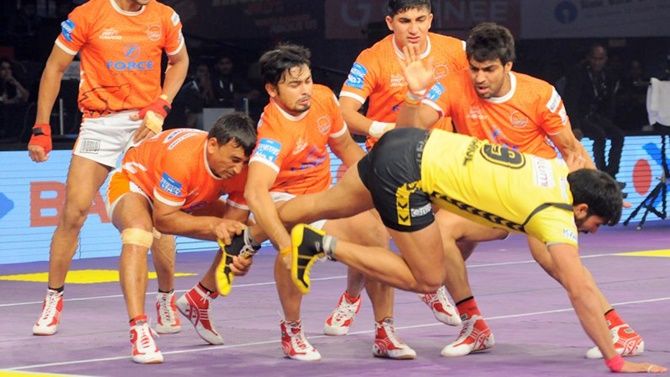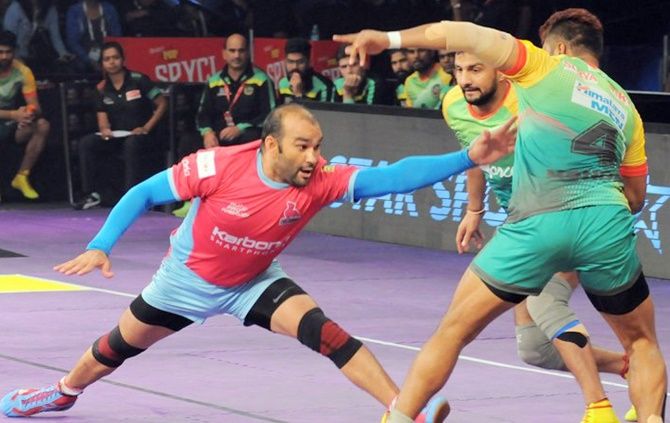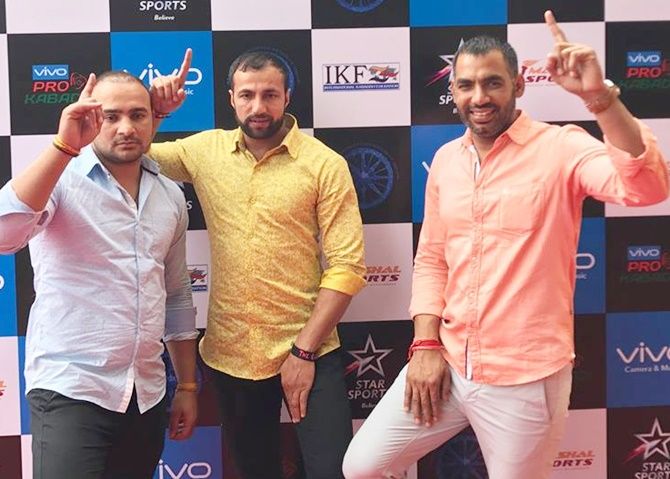Kabaddi may now be behind only cricket in the popularity stakes, notes Aabhas Sharma.

It's July 31, 2016 and a steady drizzle is falling over Hyderabad.
Outside the Gachibowli Stadium, enthusiastic fans have queued up for over two hours to watch the Patna Pirates face the Puneri Paltan in the final of the fourth edition of the Pro Kabaddi League.
There are some who are willing to fork out more than the asking price for last-minute tickets, but they go back disappointed as the arena is sold out.
Generally, such scenes are expected only at cricket matches -- not Test cricket, though -- but then kabaddi has broken several such glass ceilings in the last two years.
The PKL, for instance, is set to become the longest sports league in terms of duration in the country.
It has signed the heftiest sponsorship deal (worth Rs 300 crore/Rs 3 billion over five years) for a non-cricket sport, and has added four new teams -- some of them owned by Sachin Tendulkar, the JSW Group and the Adani group.
In a country dominated by a single sport, many sports have tried to challenge or at least replicate cricket's successful model, but have never come close.
So how did a fuddy-duddy sport like kabaddi, which lacked the cool quotient, become such an exciting property?
When broadcasters ESPN and Star Sports decided to demerge, Star faced a challenge to come up with properties beyond cricket.
As Anupam Goswami, league commissioner, PKL recalls, "We were clear that cricket was going to be numero uno, but beyond it there was immense scope for other sports."
The other sport on which Star bet heavily was kabaddi. The broadcaster has reportedly invested Rs 700 crore (Rs 7 billion) in the sport.
PKL was founded in 2014 by Mashal Sports, a company promoted by Anand Mahindra and cricket commentator Charu Sharma, along with Star Sports.
The numbers might look extremely healthy now, but it was a difficult start.

"We didn't have any sponsors for season one, but there was enough interest from fans," reminisces Goswami.
For the fourth season, there were a total of 64 sponsors -- in addition to the 52 sponsors for the eight teams, there were 12 central sponsors. They included Airtel, Bajaj Electricals and Gionee.
Come season five, with 12 teams, 130+ matches and Vivo on board as title sponsors, Star is expecting these numbers to get even better.
Goswami is clear that for any sport or a league to succeed, it has to cater to the television audiences.
While kabaddi somewhere always had a connection with the rural audience, it wasn't a cool enough sport for the urban population.
As Uday Shankar, CEO, Star India, says, "Even for an optimist like me, the response we have seen for kabaddi is surprising."
"The rise of kabaddi personally inspires me as a sports enthusiast. PKL has renewed our mindset towards kabaddi, India's very own sport," says actor Abhishek Bachchan, owner of the Jaipur Pink Panthers.
On a cumulative basis, the TV viewership for PKL has grown by 51 per cent over four seasons.
About 53 per cent of the TV audience for kabaddi is under the age of 30.
Star has managed to create a spectacle both on the ground and on television that has attracted the younger audience.
Franchise owners are delighted with how PKL has steadily grown, and as Goswami says, the profile of the new owners is a testament to the growth and potential of Kabaddi.
The cost of running a PKL team is roughly around Rs 10 crore (Rs 100 million), and from the central revenue pool and sponsors, franchisees do try to break even.
But it's still early days and as Goswami points out, the PKL is just two years old.
"The numbers are impressive for such a new league and we are confident that it will grow further," he says.

Rahul Chaudhari is the star raider for the Telugu Titans and one of the biggest crowd pullers of the PKL.
"This league has given kabaddi a platform like no other domestic sport in India," he says.
Players' lives have changed drastically since the inception of PKL.
While India has been a dominant force on the international scene, the players never got their due: aAlmost any fame and little fortune.
Travelling with the national team, they were used to staying in hostels, but PKL gives them the royal treatment: Flying across the country, staying in plush hotels and being recognised on the streets.
Mohit Chhillar, who plays for the Bengaluru Bulls, was picked up at Rs 53 lakh (Rs 5.3 million) in the players' auction of 2016.
In the first season, he was valued at Rs 5.7 lakh (Rs 570,000). There is a steady influx of foreign players in the PKL, including the likes of Iran's Meraj Sheykh and Korea's Jan Kun Lee.
The 13 weeks that follow the start of the new season in July are going to be crucial for kabaddi in the country.
It has managed to carve a niche for itself, but the outcome of season five of the PKL could redefine how other sports could have a shot at challenging the might of cricket.












